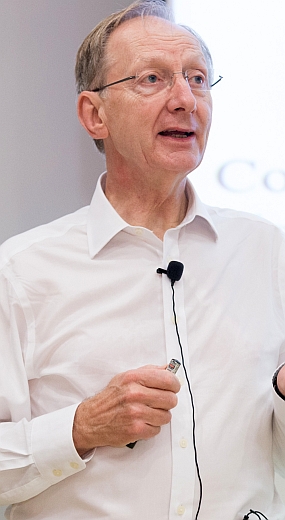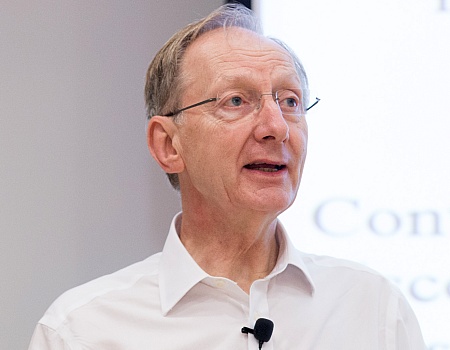

Sir John PENDRY
Imperial College London
Sir John PENDRY
Imperial College London
Research Areas:
Condensed Matter Physics, Electromagnetism
Sir John PENDRY received his PhD in Solid State Theory from the University of Cambridge in 1969. He began his career in the Cavendish Laboratory, Cambridge, and later worked at Downing College, Bell Laboratories and Daresbury Laboratory. Since 1981, he has been the Chair in Theoretical Solid State Physics in the Imperial College London where he has served as Head of Physics Department (1998-2001), and subsequently Principal of the Faculty of Physical Sciences (2001-2002). In 2015, he was awarded a Doctor of Science honoris causa from the Hong Kong University of Science and Technology.
Sir John is a condensed matter theorist known for his research into refractive indexes and creation of the first practical “Invisibility Cloak”. He has worked extensively on electronic and structural properties of surfaces developing the theory of low energy diffraction and of electronic surface states and transport in disordered systems. In 1992, Sir John turned his attention to photonic materials and developed some of the first computer codes capable of handling these novel materials. This interest led to his present research, which concerns the remarkable electromagnetic properties of materials where the normal response to electromagnetic fields is reversed leading to negative values for the refractive index.
Elected a Fellow of the Royal Society in 1984, Sir John has been Member of Council in 1992–1994, and Editor of the Proceedings A in 1996–2002. He was elected a Member of Council of the Institute of Physics (IOP) and Chairman of Institute of Physics Publishing in 2007-2011 and an Honorary Fellow of IOP in 2016. He was also named Fellow or Foreign Member in several professional organizations including the Optical Society of America, the American Academy of Arts and Sciences, US National Academy of Sciences, the Norwegian Academy of Science and Letters and the American Physical Society. He has received numerous honors and awards recognizing his contributions, culminating in his knighthood for services to science in 2004, and the Royal Medal of the Royal Society in 2006. He was also awarded the Isaac Newton Medal in 2013, the Kavli Prize in 2014, the Dan David Prize and Ugo Fano Gold Medal in 2016, the John Howard Dellinger Medal in 2017 and the SPIE Mozi Award in 2019. In 2024, he was awarded the Kyoto Prize for his ‘contribution of the theoretical construction of metamaterials to the field of materials science’.


